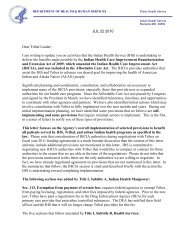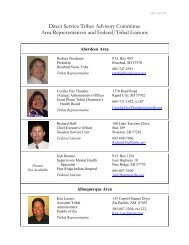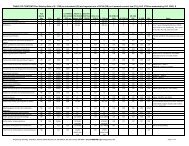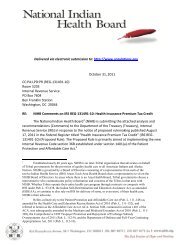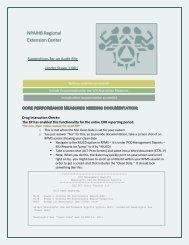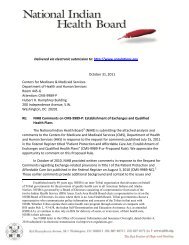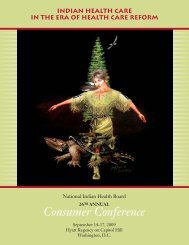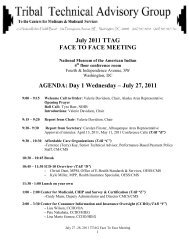mmpc - National Indian Health Board
mmpc - National Indian Health Board
mmpc - National Indian Health Board
Create successful ePaper yourself
Turn your PDF publications into a flip-book with our unique Google optimized e-Paper software.
5. Deliberative Process Privilege – Is a privilege exempting the government from<br />
disclosure of government agency materials containing opinions, recommendations, and<br />
other communications that are part of the decision-making process within the agency.<br />
6. Executive Order – An order issued by the Government’s executive on the basis of<br />
authority specifically granted to the executive branch (as by the U.S. Constitution or a<br />
Congressional Act).<br />
7. Federally Recognized Tribal governments – <strong>Indian</strong> Tribes with whom the Federal<br />
Government maintains an official government-to-government relationship; usually<br />
established by a Federal treaty, statute, executive order, court order, or a Federal<br />
Administrative Action. The Bureau of <strong>Indian</strong> Affairs (BIA) maintains and regularly publishes<br />
the list of Federally recognized <strong>Indian</strong> Tribes.<br />
8. HHS Tribal Liaisons – HHS staff designated by the head of an HHS Division that are<br />
knowledgeable about the Division’s programs and budgets, and have ready access to<br />
senior HHS Division leadership, and are empowered to speak on behalf of that Division for<br />
AI/AN/NA programs, services, issues, and concerns.<br />
9. <strong>Indian</strong> – <strong>Indian</strong> means a person who is a member of an <strong>Indian</strong> tribe as defined in 25<br />
U.S.C. 479a. Throughout this policy, <strong>Indian</strong> is synonymous with American <strong>Indian</strong>/Alaska<br />
Native.<br />
10. <strong>Indian</strong> Organizations: 1). Those Federally recognized tribally constituted entities that<br />
have been designated by their governing body to facilitate DHHS communications and<br />
consultation activities. 2). Any regional or national organizations whose board is comprised<br />
of Federally recognized Tribes and elected/appointed Tribal leaders. The government does<br />
not participate in government-to-government consultation with these entities; rather these<br />
organizations represent the interests of Tribes when authorized by those Tribes.<br />
11. <strong>Indian</strong> Tribe – an <strong>Indian</strong> or Alaska Native tribe, band, nation, pueblo, village, or<br />
community that the Secretary of the Interior acknowledges to exist as an <strong>Indian</strong> tribe<br />
pursuant to the Federally Recognized <strong>Indian</strong> Tribe List Act of 1994, 25 U.S.C. 479a.”<br />
12. Intradepartmental Council on Native American Affairs (ICNAA) – Authorized by the<br />
Native American Programs Act of 1974 (NAPA), as amended. The ICNAA serves primarily to<br />
perform functions and develop recommendations for short, intermediate, or long-term<br />
solutions to improve AI/AN/NA policies and programs as well as provide recommendations<br />
on how HHS should be organized to administer services to the AI/AN/NA population.<br />
13. Joint Tribal/Federal Workgroups and or/Task Forces – A group composed of<br />
individuals who are elected Tribal officials, appointed by Federally recognized Tribal<br />
governments and/or Federal agencies to represent their interests while working on a<br />
particular policy, practice, issue and/or concern.<br />
14. Native American (NA) – Broadly describes the people considered indigenous to North<br />
America.<br />
15. Policies with Tribal Implications – Refers to regulations, statutes, legislation, and other<br />
policy statements or actions that have substantial direct effects on one or more <strong>Indian</strong><br />
Tribes, on the relationship between the Federal Government and <strong>Indian</strong> Tribes, or on the<br />
distribution of power and responsibilities between the Federal Government and <strong>Indian</strong><br />
Tribes.<br />
16. Self Government – Government in which the people who are most directly affected by<br />
the decisions make decisions.



